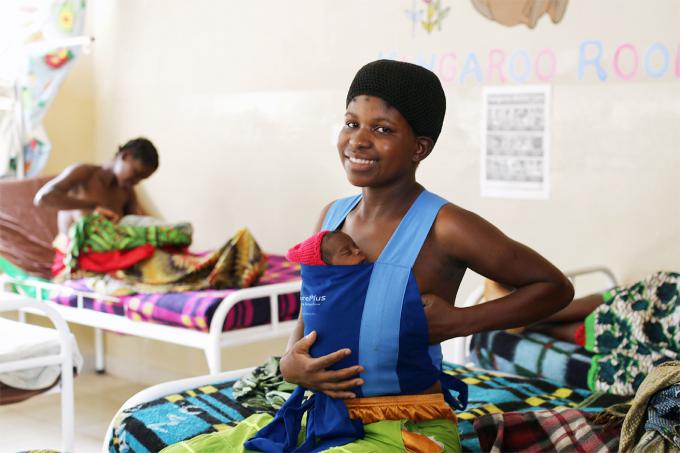KANGAROO MOTHER CARE IN MALAWI: IMPROVING UPTAKE USING A CUSTOMIZED WRAP

One-third of all newborn deaths (37%) in Malawi result from direct complications of prematurity (37%). In an effort to prevent these deaths, the Government of Malawi has prioritized Kangaroo Mother Care (KMC) as part of their effort to increase access to quality health services for mothers and children. The success of KMC depends, in part, on the ability of mothers and caregivers to practice continuous skin-to-skin contact, whereby infants are placed vertically on the chest between the mother’s breasts below her clothes.
Though KMC has been proven to save lives and improve child development, practicing KMC, as recommended, can be difficult for mothers. Pain and fatigue are common barriers in low- and middle-income countries, with mothers indicating that the baby is too difficult to hold; that they experience physical discomfort on the chest or back, and that it is difficult to maintain the proper position of the infant, especially when the mother is sleeping. In Malawi, women have expressed challenges in using the traditional wrapper – chitenje – to practice KMC.
A new study by Save the Children in partnership with the Malawi Ministry of Health provides evidence that the customized KMC wrap-CarePlus is highly acceptable to mothers and contributes to improved skin-to-skin practices in comparison to the traditional wrap ‘chitenje’. The CarePlus Wrap was developed by Laerdal Global Health (LGH) in 2015 in order to improve uptake of KMC. It was designed with the intention of local production at a low cost.
Between 2016 and 2017, Save the Children and the Ministry of Health conducted a randomized control study aimed at evaluating the acceptability and effectiveness of the customized KMC wrap-CarePlus to improve adherence to KMC practices. The study targeted 301 mothers in the southern region of Malawi: Machinga district Hospital, Thyolo district Hospital and Queen Elizabeth Central Hospital in Blantyre. The study subjects were divided in two control groups, one group (152) receiving the customized wrap and the other (149) receiving the traditional ‘chitenje’ wrap.
The results of the study have revealed a high acceptability of the customized wrap over the traditional wrap including: 95% of mothers saying they would recommend the customized wrap. The customized wrap improved skin-to-skin practices in facility KMC with 44% of mothers reporting longer hours of use of the customized wrap ( 20 or more hours) compared to 33% using the traditional ‘chitenje’. Regardless of the wrap used, women reported satisfaction with their baby’s progress on KMC (94%) and would recommend KMC to others (99%). The customized wrap did not reduce other essential newborn practices, such as breastfeeding.
The study makes recommendations for the promotion of KMC, calling on the Government and stakeholders to incorporate a customized wrapper in the district health system planning by including it in the procurement catalogue and expenditure plan.
The results of this study have been published in PLOS ONE a peer reviewed journal.
For more information about this study contact: Kondwani.Chavula@savethechildren.org Or Edith.Tsilizani@savethechildren.org
 Malawi
Malawi